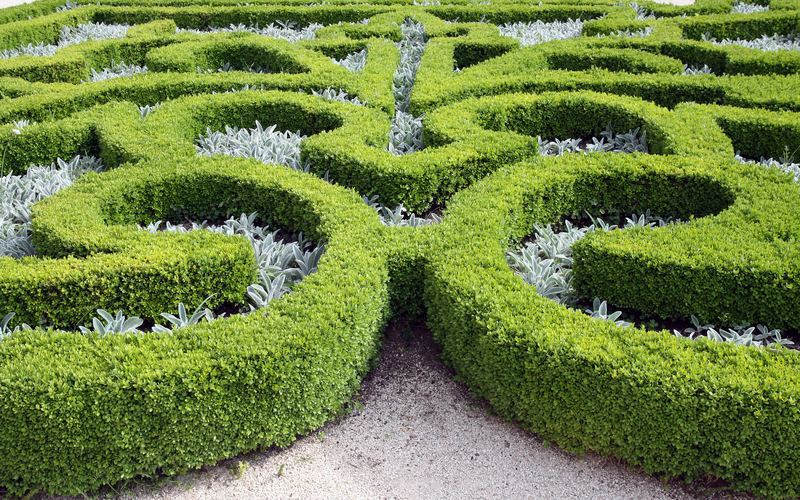Lay the Groundwork: 9 Gardening Tips for Enthusiastic Beginners
Posted on 12/09/2025
Lay the Groundwork: 9 Gardening Tips for Enthusiastic Beginners
Are you eager to nurture your very own lush greenspace but unsure where to start? Gardening for beginners can seem overwhelming, but with the right advice, you'll find it a deeply rewarding and enjoyable journey. In this detailed guide, we take you through nine essential gardening tips to help you lay a solid foundation -- bringing your outdoor sanctuary to life.
Why Gardening?
From the therapeutic benefits of being outdoors to the joy of harvesting your own flowers, fruits, or vegetables, beginning a garden offers a wealth of physical and mental advantages. Whether you have a sprawling backyard or a modest balcony, cultivating a garden enhances your living space and fosters a stronger connection with nature. But before you dig in, it's crucial to approach it step by step -- ensuring not just plant survival, but vibrant growth.

Getting Started: Setting Up for Success
Ready to transform your patch of earth? Beginner tips for gardening focus on laying the groundwork. By planning thoughtfully, you'll reap better gardening results and enjoy the process even more. Here's how to start:
1. Assess Your Space and Sunlight
Every garden is different! The first step in starting a garden is evaluating your growing environment. Observe how sunlight travels across your space throughout the day. Most vegetables and flowers need at least 6 hours of direct sunlight. Be mindful of shadow-casting trees, fences, or buildings that might limit light. If you're gardening indoors or on a balcony, choose plant varieties suited to partial shade or indirect light.
- Tip: Sketch a quick map of your yard noting sun patterns, slopes, and existing plants.
- Match plant sunlight requirements to specific zones in your space for optimal growth.
2. Choose the Right Plants
Selecting suitable plants is vital for beginner gardening success. Consider your hardiness zone (check the USDA Plant Hardiness Zone Map for U.S. gardeners), which tells you which plants can thrive in your climate. Factors like soil type, rainfall, and local pests will also influence your choices.
- For easy wins: Start with resilient, low-maintenance plants like marigolds, sunflowers, mint, lettuce, or radishes.
- Avoid finicky plants that require specialized skills until you build confidence.
3. Test and Prepare Your Soil
Healthy gardens begin with healthy soil. Test your soil for pH, texture, and nutrient content -- inexpensive test kits are widely available. Ideal garden soil is rich in organic matter, drains well, and is neither too acidic nor alkaline.
- Enrich your soil with compost, aged manure, or well-rotted leaves before planting.
- If you're planting in containers, use a premium potting mix designed for the plants you chose.
- Mulch your beds after planting to retain moisture and suppress weeds.
4. Gather the Right Tools
Gardening doesn't require a shed full of fancy equipment. For beginner gardeners, a few core tools make all the difference:
- Trowel for digging and transplanting
- Pruners for trimming and shaping plants
- Gloves to protect your hands
- Watering can or hose with adjustable spray
- Hand fork or cultivator to loosen and aerate
Remember, caring for your tools ensures they last. Clean and dry them after use to prevent rust and extend their life.
5. Learn to Water Properly
One of the most common beginner gardening mistakes is over- or under-watering. Seedlings and new plantings need frequent, gentle watering to establish roots, while mature plants prefer deeper, less frequent drinks.
- Water in the morning to minimize evaporation and reduce disease risk.
- Use your finger to gauge soil moisture; water when the top inch feels dry.
- Focus water at the base of plants, avoiding wetting the leaves whenever possible.
6. Start Small and Expand Gradually
As tempting as it is to go big from the outset, small garden projects are best for beginners. Confine your first plot to a manageable size so it won't overwhelm you with maintenance or costs. This approach allows you to learn, experiment, and enjoy successes.
- Try a few containers, raised beds, or a compact border garden.
- Track what works best in your space and scale up your garden each season.
7. Master Basic Garden Maintenance
A thriving garden requires consistent upkeep. Make time each week to observe, weed, prune, and tidy up. Quick attention to problems -- like pests or disease -- can stop them from spreading.
- Weed regularly to minimize competition for nutrients.
- Deadhead spent flowers to encourage more blooming.
- Remove any damaged or diseased foliage promptly.
Tip: Keep a small garden diary. Jotting down notes on what you planted, when you watered, and any issues noticed helps you learn and improve year after year.
8. Feed Your Plants Wisely
Beginner gardeners sometimes assume all plants need lots of fertilizer -- but that's not always true. Overfeeding can harm plants and reduce yields. Start with healthy soil and supplement only as needed.
- Organic fertilizers and compost improve soil structure and offer balanced nutrients.
- Follow label instructions if using store-bought feeds to avoid burning roots.
Observe leaf color and growth rate to adjust your feeding regimen accordingly for lush and strong plants.
9. Be Patient -- and Enjoy the Process
Gardening is a journey, not a race. Even the most experienced gardeners have the occasional flop. Embrace small setbacks as valuable lessons, and celebrate every bit of growth. Over time, you'll gain confidence and your gardening skills will flourish.
- Join gardening communities online or locally for advice, inspiration, and encouragement.
- Take photos of your progress -- it's motivating to look back and see how far your garden has come!
Bonus Tips for Beginner Gardeners
- Rotate crops seasonally to prevent soil depletion and reduce pest issues.
- Label plants so you remember what you've planted (especially helpful for seedlings and perennials).
- Start with seeds or seedlings depending on your goals, time, and space. Beginners may find seedlings are easier to manage at first.
- Read up on the specific needs of each plant to avoid common beginner mistakes.
Common Beginner Gardening Mistakes (and How to Avoid Them)
- Overwatering or underwatering: Water deeply but infrequently, and check soil moisture often.
- Planting too densely: Provide space between seedlings for air flow and growth.
- Ignoring soil health: Feed your soil, not just your plants!
- Neglecting sunlight requirements: Group plants based on their sun/shade needs to prevent weak or leggy growth.
- Skipping regular maintenance: Set aside time each week to check your garden and keep it in shape.
Planning Ahead: Set Your Garden Up for Year-Round Success
Don't limit your gardening ambitions to one season! Fall is perfect for planting bulbs and cool-season veggies; winter is the time to research and prep your space with compost or mulch; spring and summer bring the main growing season. Plan your plantings so there's always something blooming or ready to harvest.
- Rotate plantings and try succession planting for a steady crop all season.
- Use trellises, hanging baskets, or vertical gardens to maximize tight spaces.
- Invest in perennials for repeat color and interest year after year.

Gardening Inspiration: What Can You Grow as a Beginner?
Wondering where to start? Here are some beginner-friendly plants you can try right away for a quick sense of accomplishment:
- Herbs: Basil, mint, parsley, and chives thrive in pots or garden beds.
- Vegetables: Lettuce, radishes, carrots, and bush beans are reliable starters.
- Flowers: Sunflowers, marigolds, pansies, and zinnias are beautiful and easy to grow.
- Succulents: For indoor or balcony gardens with minimal fuss, succulents provide aesthetic appeal and resilience.
As your success and confidence build, experiment with new varieties and more complex garden arrangements.
Final Thoughts: Your Gardening Journey Begins Now
Starting your gardening adventure as a beginner is one of the most gratifying hobbies you can cultivate. With these 9 essential gardening tips for beginners, you'll have the support and practical know-how to create a vibrant, thriving garden. Every flower you nurture and every vegetable you harvest reflects your effort and care.
So, roll up your sleeves, dig into the earth, and watch as your new garden -- and your confidence -- blossoms.
Happy gardening!
Latest Posts
Quick-Growing Hedges: 9 Varieties for Privacy
Create a Garden Sanctuary for Pooches and Plants
Steps to Design an Inspiring Garden for Young Minds
The Frugal Gardener's Guide to Low Maintenance
Lay the Groundwork: 9 Gardening Tips for Enthusiastic Beginners

